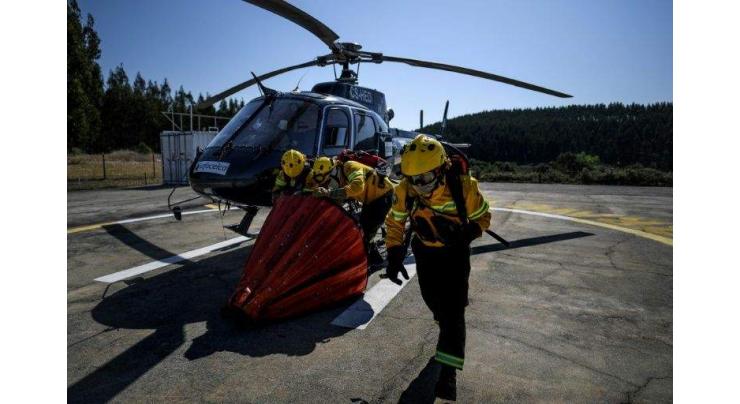
Portugal's Private Firefighters Watch Over Volatile Forests
Muhammad Irfan Published October 23, 2019 | 01:25 PM

Pedro Simoes pulls on a flame-resistant suit as he prepares to fly over a eucalyptus forest in central Portugal, a near daily routine aimed at protecting his boss's bottom line
Constncia, Portugal, (APP - UrduPoint / Pakistan Point News - 23rd Oct, 2019 ) :Pedro Simoes pulls on a flame-resistant suit as he prepares to fly over a eucalyptus forest in central Portugal, a near daily routine aimed at protecting his boss's bottom line.
He is part of a team of 250 private firefighters employed by Portugal's key paper pulp industry, Europe's third largest, to protect its crop in a country regularly hit by deadly wildfires.
In most countries, it is the state that takes on the exclusive responsibility of protecting forests from fires.
In Portugal however, the country's two biggest pulp and paper firms, Navigator and Altri, set up their own firefighting force, called Afocelca, in 2002.
Portugal's paper industry uses mainly fast-growing eucalyptus trees, which environmentalists say are one reason the country suffers so many wildfires, such as those which claimed over 100 lives in 2017.
After the 2017 fires, which devastated a record 500,000 hectares (1.2 million acres) the government imposed a limit on the area that can be given over to the crop.
That was bad news for the paper and pulp sector, which accounts for 4.6 percent of Portugal's exports.
Many experts say the problem with eucalyptus trees is not just that they burn easily, but that their leaves and bark are easily swept away by the wind, which helps spread wildfires.
- Eucalyptus 'not at fault' - Simoes, a 39-year-old former volunteer firefighter who now heads one of Afocelca's three firefighting helicopter units, takes a different view.
While wildfires were becoming "more and more intense, it's not the fault of eucalyptus trees," he argued.
"In the forests that belong to our firms, the flames don't advance so ferociously. It's the abandonment of forests which causes big fires," said Simoes.
The pulp and paper sector is Portugal's largest forest owner.
It controls 150,000 hectares of eucalyptus trees such as those surrounding the central town of Constancia and its pulp factory on the banks of the river Tagus around 100 kilometres (60 miles) northeast of Lisbon.
Their private firefighting force Afocelca has an annual budget of three million Euros ($4.
4 million).
And as well as protecting their own forests, they sometimes help civil protection units fight wildfires outside their domain.
The paper industry also spends another three million in forest maintenance outside of the peak summer wildfire season.
"The ideal is to fight fires outside of our properties," before they reach company land, Afocelca's regional coordinator Rui Ventura told AFP.
His team always works closely with Portugal's civil protection force, which has 6,000 volunteer firefighters supporting a force of 1,500 full-time specialists.
- 'Eucalyptus epidemic' - Forests of tall, slender eucalyptus trees cover over 900,000 hectares in Portugal, a quarter of total forest land.
They have displaced the native oaks, laurels and chestnuts, which environmentalists say are more fire-resistant trees.
Forestry expert Paulo Pimenta de Castro is one of those who blame a "eucalyptus epidemic" for the most devastating fires.
He heads up Acrescimo, an association that promotes sustainable forestry.
"It's not a matter of demanding the eradication of these trees, but to understand the risks associated with the eucalyptus business," he said.
The problem is that around two-thirds of the eucalyptus forests are not managed, he added.
The trees are pruned every 10 years, but if the extremely flammable undergrowth is not cleaned up in between, the risk of fires increases exponentially, he said.
Pimenta de Castro acknowledged that the industry does manage its own plantations.
But they still buy wood cheaply from thousands of small producers who do not follow safety guidelines.
Acrescimo's position is that the paper sector should be required to grow 50 percent of its own timber: currently that figure is set at 20 percent.
A spokesman for Portugal's paper industry association CELPA said they were constantly working to increase their own acreage.
But this depended on the willingness of small landowners to cede their land -- and they control 78 percent of Portugal's forests, he said.
Related Topics
Recent Stories

PTI backed SIC nominates Hamid Raza for role of PAC chairman

PM vows to work for country along with students

US ambassador meets Senate Chairman, discusses bilateral ties

UHS to issue MBBS degrees within three months after final result

Aiman Khan granted UAE Golden Visa

PSX achieves significant milestone, surpasses 72,000 mark

Pak Vs NZ T20I: Orphaned children extended special invitation to watch match

Finance Minister lauds UNDP’s unwavering support during floods

President Raisi leaves for Iran from Karachi

Currency Rate In Pakistan - Dollar, Euro, Pound, Riyal Rates On 24 April 2024

Today Gold Rate in Pakistan 24 April 2024

Punjab CM inaugurates Pakistan’s first Virtual Women Police Station
More Stories From World
-
Thousands in heatwave-hit Bangladesh pray for rain
9 minutes ago -
EU urges probe into reported mass graves at Gaza hospitals
19 minutes ago -
Gucci owner Kering's shares sink after profit warning
19 minutes ago -
Extreme heat scorches Southeast Asia, bringing school closures and warnings
29 minutes ago -
Ambassador Hashmi greets China on Space Day
39 minutes ago -
Mass cancellations loom despite French air union calling off strike
59 minutes ago
-
Record-breaking London stocks spearhead global rally
1 hour ago -
'City Hunter' manga hero drops the sexism for new live-action film
1 hour ago -
Russian deputy defence minister held over bribery accusations
1 hour ago -
Danger warning issued for Bangkok as extreme heat bites
1 hour ago -
Iran cuts Syria presence after strikes blamed on Israel: monitor
1 hour ago -
Four injured as escaped army horses bolt through central London
1 hour ago